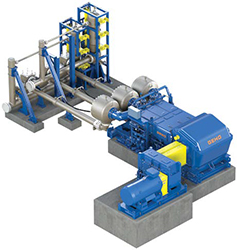
A GEHO TZPM heat barrier pump is used in an autoclave feed application to
help process heated nickel laterite. (Photo: Weir)
Heat Barrier Pumps Demonstrate
Unsurpassed Service in Nickel
Autoclave Applications
A unique valve design with special materials enhances durability
By Tony Hendriks and Xiaohong Wei

‘At the start of the decade,’ according to the International Energy Forum (IEF), ‘just 4% of nickel produced globally was used in car batteries, but this could increase to as much as 40% by 2030 as bans on internal combustion engine vehicles approach in many markets.’
Nickel is recovered using high-pressure autoclave technology, which poses several challenges from a processing perspective. It requires pumping high pressure, high temperature and often corrosive slurry.
Weir’s GEHO heat barrier piston diaphragm pumps are designed for these arduous duties and the company recently manufactured and tested the largest autoclave feed pump in the world, the GEHO TZPM2000HB. Two of these pumps have now been delivered and are currently being commissioned at a nickel mine in Indonesia.
Meeting Nickel Demand
Indonesia is now the world’s largest
nickel producer, mining 37% of global
supply and forecast to increase to twofifths
by 2030. This growing demand
is causing many miners to increase
their production capacity, which means
there is a trend towards larger, higher-
capacity pumps.
This evolution has unfolded over three decades, with Weir being involved in the development of pumps for autoclave feed applications from the outset. The GEHO TZPM2000HB continues to push the boundaries of what’s possible, not just in terms of pump capacity but, crucially, the size of the pump allows the operator to run it at the low speed.
In other words, increasing capacity by running existing, smaller pumps at higher speeds in such a demanding application often leads to failure. It significantly increases wear and the risk of equipment failure, resulting in reduced availability and, ultimately, lost production. When sizing these pumps, Weir draws on more than 30 years of installation, operational and servicing data and experience in high-pressure acid leach (HPAL) applications. Moreover, this information is also fed back to the engineering teams and informs pump design and development.
Understanding and
Reducing Wear
The slurry enters the pump through
the suction valve and flows out via the
discharge valve. Both valves come into
direct contact with the hot, erosive and
corrosive slurry, so it’s important that
they are highly wear resistant.
In more general applications, the valves have a valve ring that can seal off to guard against coarse particles. But in autoclave feed applications, the valve and the seat have only metal- to-metal contact and, as a result, are more susceptible to coarse particle wear caused by washout (i.e., localized wear due to slurry getting between the seat and valve).

From a technology standpoint, GEHO heat barrier pumps feature a unique valve design with special material selection that enhance valve durability in these demanding duties. From a servicing perspective, in addition to replicator valves failing prematurely, they also lack comprehensive service support.
Weir, in contrast, has a global footprint with extensive servicing and support capabilities, which includes having consumables on hand in all major nickel mining regions.
Pumping High Temp Slurries
GEHO heat barrier pumps have a
unique combination of separator, cooler
and diaphragm section whereby hot
slurry is cooled and any contact with
the pump’s moving parts is eliminated.
The separator section prevents the
hot slurry from directly exchanging
heat with the slurry in the cooling section,
thereby minimising the cooling
capacity required.
In large pumps like the GEHO TZPM2000HB, this is achieved with a free-floating separator disc that follows the piston and diaphragm movement. A water jacket cooling pipe, then cools further down the slurry and prevents hot slurry from coming into contact with the diaphragm.
The diaphragm separates the slurry from the pump’s moving parts, allowing them to be maintained at predictive intervals of 8,000 hours, typically once per year.
Delivering Reliability
In nickel autoclave applications, piston
diaphragm pumps have to handle
larger volumes and pressures, which
means the dynamic loads are higher.
These larger pumps introduce more
flow and pressure pulsations, which
present further challenges.
To cope with these loads, the GEHO heat barrier pumps have a single-piece casted power end and forged steel crankshaft, both field-proven for decades, underscoring their reliability.
Furthermore, the GEHO TZPM heat barrier pumps feature a slide-mounted frame, allowing the entire pump to slide backward a few millimetres when it expands due to thermal elongation. This design prevents pump piping from bending, eliminates undue stress, and avoids the formation of cracks, maintaining the pump’s integrity without relying on expansion seals prone to premature failure.
Suction and discharge air vessels are also installed to compensate for the flow and pressure pulsations generated by the pump, ensuring that vibrations of the pump and connected piping are minimized.
Nickel is a critical mineral in the energy transition, but meeting demand will require innovative technologies to optimise existing processes. The GEHO heat barrier pumps is indicative of the role that mining technologies and solutions will need to play in improving operational efficiency and, ultimately, enabling the transition to a low-carbon economy.
Tony Hendriks is the global product manager for GEHO PD Pumps and Xiaohong Wei is a regional sales manager for GEHO PD Pumps.